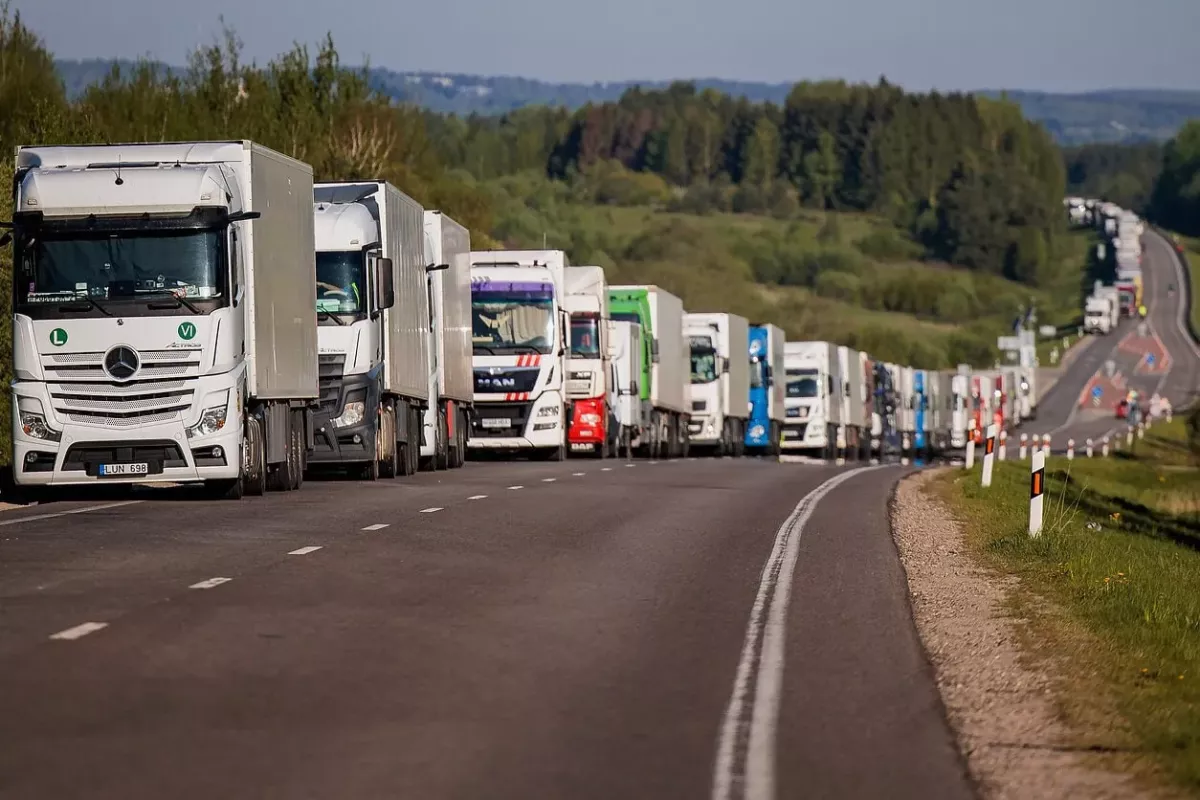Lithuania–Belarus: Trucks between politics and common sense Trapped on the border
On October 29, the Lithuanian government in Vilnius decided, for political reasons, to close all border crossings with Belarus. On the other side of the newly erected “Iron Curtain,” hundreds of Lithuanian trucks were left stranded, with their owners suffering huge losses.
A lock on the Lithuanian corridor
Thousands of vehicles and trailers from Lithuania have been blocked on Belarusian territory. The border closure, imposed by the Lithuanian government, will remain in effect until November 30. Many drivers have been forced to live in their truck cabins for more than ten days.
Each day of downtime for a truck costs between €400 and €800. The number of stranded vehicles is estimated at between 2,000 and 5,000. Even at the minimum estimate—2,000 trucks—their daily downtime amounts to €0.8–1.6 million in losses, and a week of inactivity results in €5.6–11.2 million in damages.

This is a heavy blow not only to transport companies holding international licences (of which there are over 6,000 in Lithuania) but also to the entire national economy. The automotive sector, where freight transport accounts for 90% of operations, contributes up to €2 billion annually to Lithuania’s state budget and social funds.
Since the declaration of independence, the Lithuanian economy has been closely tied to transport logistics and transit. The country’s territory serves as an important segment of the corridor between East and West. Major freight flows pass through here from China via Central Asia, Azerbaijan, Georgia, Russia, and Belarus — and then from Lithuania onward to Western Europe. In recent years, road freight transport has become one of the fastest-growing and most significant sectors of the Lithuanian economy. In 2019, it accounted for 9% of the GDP of this Baltic republic.
In no other EU country has the transport sector made up such a substantial share of national income. Moreover, 90% of freight traffic was international — placing Lithuania first in the European Union by this measure. It is safe to say that international transport has become Lithuania’s hallmark specialisation on the European market.
After the introduction of sanctions, trade with Russia and Belarus declined, yet Lithuania remained an important part of the transit route for goods from China. Its significance along the “New Silk Road” increased after the start of the war in Ukraine, when the direct route to Europe began passing through Belarus. In 2024, Lithuanian transport companies carried 140 million tonnes of cargo.
Now, however, this major logistical artery has been blocked by the decision of the Lithuanian government.
This time, Belarus did not play the role of the “punching bag” constantly subjected to sanctions and restrictions. Minsk’s response was a mirror measure: in reaction to Vilnius’s unfriendly step, the movement of Lithuanian freight transport through Belarusian territory was likewise banned. In addition, border crossings to Poland and Latvia have been closed to Lithuanian trucks. They will be able to return only after Lithuanian authorities reopen their own checkpoints.
The Lithuanian side has allowed limited passage through the Medininkai border crossing point for diplomats, Lithuanian and EU citizens, and several other categories. Some Lithuanian trucks are managing to cross the border, but at an extremely slow pace due to the imposed restrictions. According to the Belarusian authorities, only 180 truck-trailer units crossed the border in the first five days. Up to 2,000 vehicles remain stuck at the Šalčininkai and Medininkai checkpoints. The Belarusian State Customs Committee emphasised that no trucks are being forcibly detained — everything depends on the goodwill of the Lithuanian authorities.
A blow to Lithuania’s own interests
The situation threatens Lithuania with the loss of 35,000 jobs and a significant shortfall in state tax revenues. In just the first half of 2025, export earnings from road transport services amounted to €2.5 billion. Now, carriers are warning of potential losses reaching €1 billion.

The Secretary-General of the International Transport and Logistics Alliance (ITLA), Povilas Drizas, stated: “Our trade relations are already starting to suffer from the negative impact of this border closure. Lithuania risks gradually disappearing from the logistics and trade map. The problem has gone beyond just transportation.”
On November 2, representatives of transport companies belonging to the Lithuanian National Road Carriers’ Association (Linava) appealed to Prime Minister Inga Ruginenė, urging her to resolve the situation without delay. Otherwise, the carriers are prepared to stage protests. The operators are demanding a clear government plan to resolve the crisis it has created.
The situation is indeed critical. The most profitable season for carriers has arrived — the period leading up to the traditional Christmas shopping rush in Europe. And yet, Lithuanian transport companies have received a “Christmas gift” from their own government (or perhaps from their “second government” — in Brussels?).
Even if border crossings through Latvia or Poland are reopened in the future, carriers will face additional costs. Depending on the route from China through Kazakhstan and Russia, detours via Latvia could add between 400 and 800 kilometres. According to estimates by the Lithuanian newspaper Respublika, this could cost transport companies €300–400 million annually.
Naturally, competitors — both from neighbouring Poland and from the “old” EU member states — will waste no time taking advantage of the situation.
In recent years, there have been real “logistics wars” between carriers from Western and Eastern Europe. The advantage was on the side of Eastern European companies, which, thanks to lower operating costs and other factors, managed to capture 40–60% of the Western European freight transport market. This provoked dissatisfaction among Western operators, who, through their lobbying efforts in the European Parliament, pushed through the so-called Mobility Package — a strict regulatory framework that severely restricted Eastern European, including Lithuanian, carriers. Now, competitors may push Lithuanian companies out of the game altogether.

The Lithuanian government has made no secret of the fact that the decision to close the border was intended to exert pressure on the “Belarusian regime,” including by reducing Belarus’s income from transit. Lithuanian Foreign Minister Kęstutis Budrys also referred to the “indirect benefits of transit for the regime.”
It is evident that this escalation — which runs counter to Lithuania’s national interests — was undertaken at Brussels’s insistence. After all, no government that truly cares about its country would harm its neighbours at the cost of its own massive losses.

On November 6, Prime Minister Inga Ruginenė announced that Vilnius had asked Minsk to allow stranded Lithuanian tractors and trailers to return, yet the Lithuanian side still has no intention of reopening the border. The Belarusian Foreign Ministry, in turn, called on Vilnius to reverse its decision to close the crossings and to restore normal relations along the border.








